University Mental Health Assessment: Harry's MSE and Nursing Report
VerifiedAdded on 2023/06/08
|5
|1275
|226
Report
AI Summary
This report presents a Mental State Examination (MSE) and nursing care plan for Harry, an 18-year-old high school student admitted to the emergency department following concerning behavior. The MSE assesses Harry's general appearance, behavior, speech, mood, thought processes, content, perception, cognition, judgment, and insight. The report highlights symptoms such as substance abuse, depersonalization, insomnia, and negative thoughts. Intervention strategies include substance abuse counseling, psychotherapy, and medication management (antidepressants). The nursing report outlines Harry's current status, including maladaptive behaviors, impaired school performance, and sleep disturbances, and proposes a care plan involving medication treatment, hospital admission for close monitoring, and psychotherapy. References to relevant literature support the assessment and interventions. This report aims to provide a comprehensive overview of Harry's mental state and guide appropriate nursing interventions.
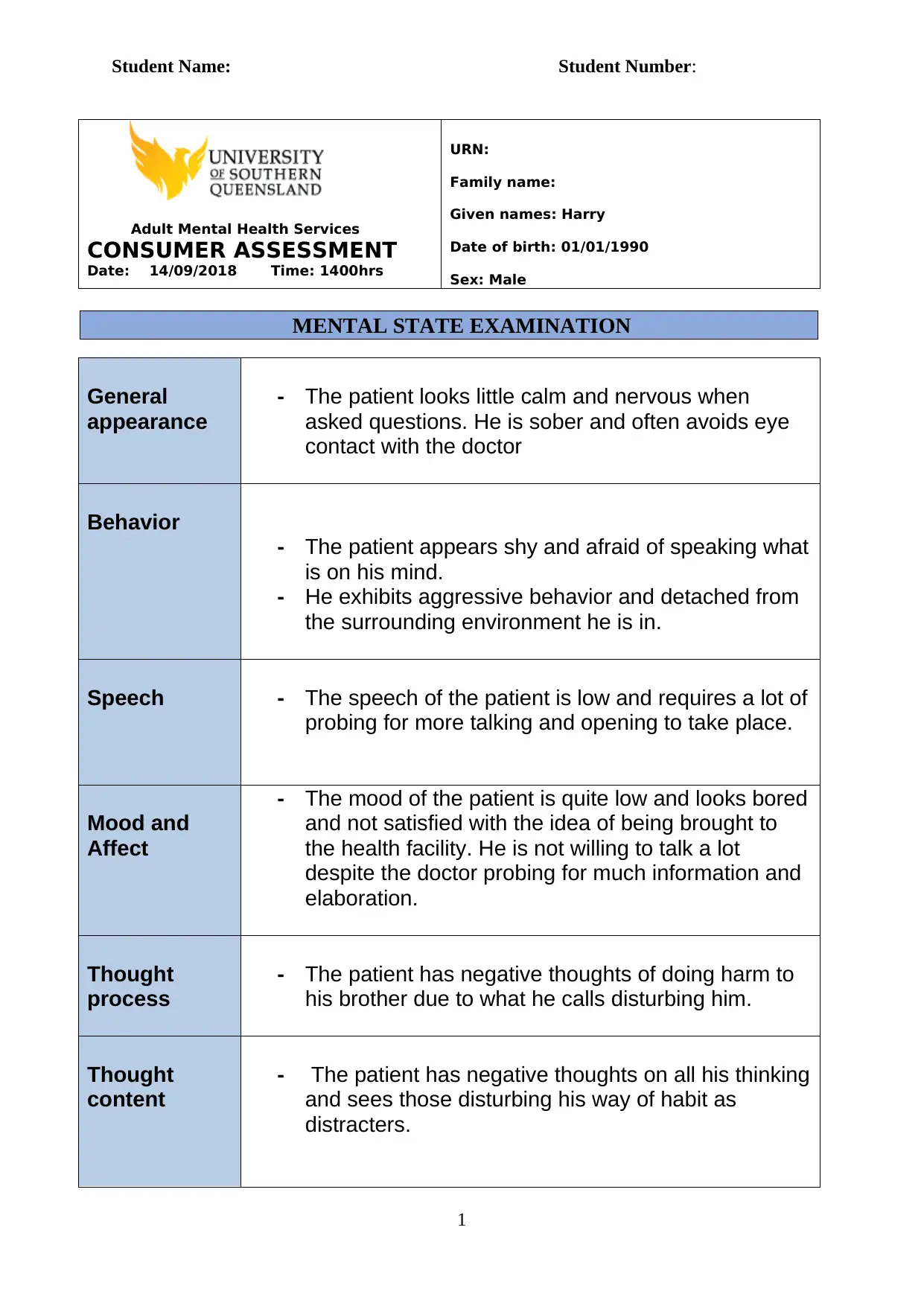
Student Name: Student Number:
Adult Mental Health Services
CONSUMER ASSESSMENT
Date: 14/09/2018 Time: 1400hrs
URN:
Family name:
Given names: Harry
Date of birth: 01/01/1990
Sex: Male
MENTAL STATE EXAMINATION
General
appearance
- The patient looks little calm and nervous when
asked questions. He is sober and often avoids eye
contact with the doctor
Behavior
- The patient appears shy and afraid of speaking what
is on his mind.
- He exhibits aggressive behavior and detached from
the surrounding environment he is in.
Speech - The speech of the patient is low and requires a lot of
probing for more talking and opening to take place.
Mood and
Affect
- The mood of the patient is quite low and looks bored
and not satisfied with the idea of being brought to
the health facility. He is not willing to talk a lot
despite the doctor probing for much information and
elaboration.
Thought
process
- The patient has negative thoughts of doing harm to
his brother due to what he calls disturbing him.
Thought
content
- The patient has negative thoughts on all his thinking
and sees those disturbing his way of habit as
distracters.
1
Adult Mental Health Services
CONSUMER ASSESSMENT
Date: 14/09/2018 Time: 1400hrs
URN:
Family name:
Given names: Harry
Date of birth: 01/01/1990
Sex: Male
MENTAL STATE EXAMINATION
General
appearance
- The patient looks little calm and nervous when
asked questions. He is sober and often avoids eye
contact with the doctor
Behavior
- The patient appears shy and afraid of speaking what
is on his mind.
- He exhibits aggressive behavior and detached from
the surrounding environment he is in.
Speech - The speech of the patient is low and requires a lot of
probing for more talking and opening to take place.
Mood and
Affect
- The mood of the patient is quite low and looks bored
and not satisfied with the idea of being brought to
the health facility. He is not willing to talk a lot
despite the doctor probing for much information and
elaboration.
Thought
process
- The patient has negative thoughts of doing harm to
his brother due to what he calls disturbing him.
Thought
content
- The patient has negative thoughts on all his thinking
and sees those disturbing his way of habit as
distracters.
1
Paraphrase This Document
Need a fresh take? Get an instant paraphrase of this document with our AI Paraphraser
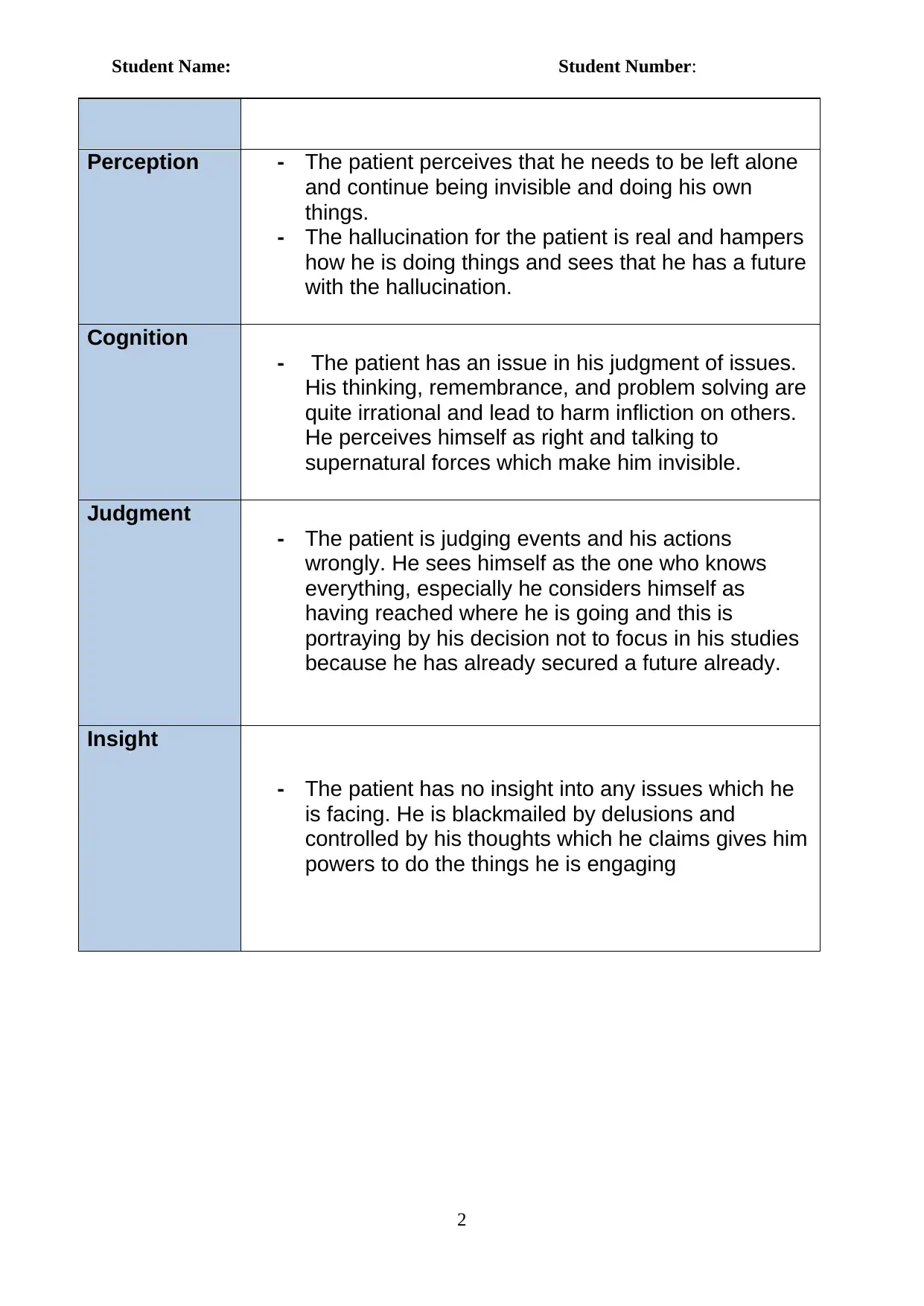
Student Name: Student Number:
Perception - The patient perceives that he needs to be left alone
and continue being invisible and doing his own
things.
- The hallucination for the patient is real and hampers
how he is doing things and sees that he has a future
with the hallucination.
Cognition
- The patient has an issue in his judgment of issues.
His thinking, remembrance, and problem solving are
quite irrational and lead to harm infliction on others.
He perceives himself as right and talking to
supernatural forces which make him invisible.
Judgment
- The patient is judging events and his actions
wrongly. He sees himself as the one who knows
everything, especially he considers himself as
having reached where he is going and this is
portraying by his decision not to focus in his studies
because he has already secured a future already.
Insight
- The patient has no insight into any issues which he
is facing. He is blackmailed by delusions and
controlled by his thoughts which he claims gives him
powers to do the things he is engaging
2
Perception - The patient perceives that he needs to be left alone
and continue being invisible and doing his own
things.
- The hallucination for the patient is real and hampers
how he is doing things and sees that he has a future
with the hallucination.
Cognition
- The patient has an issue in his judgment of issues.
His thinking, remembrance, and problem solving are
quite irrational and lead to harm infliction on others.
He perceives himself as right and talking to
supernatural forces which make him invisible.
Judgment
- The patient is judging events and his actions
wrongly. He sees himself as the one who knows
everything, especially he considers himself as
having reached where he is going and this is
portraying by his decision not to focus in his studies
because he has already secured a future already.
Insight
- The patient has no insight into any issues which he
is facing. He is blackmailed by delusions and
controlled by his thoughts which he claims gives him
powers to do the things he is engaging
2
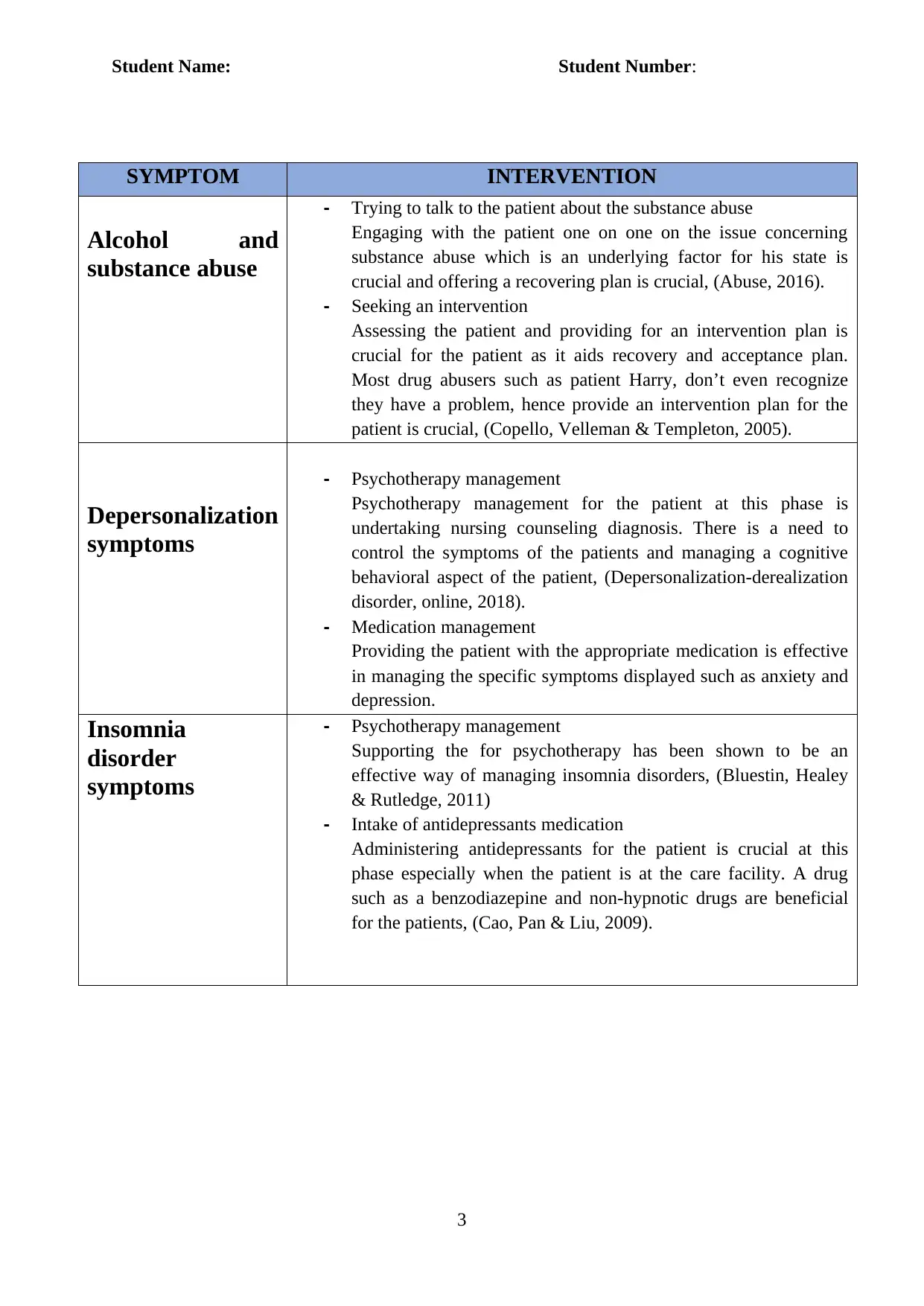
Student Name: Student Number:
SYMPTOM INTERVENTION
Alcohol and
substance abuse
- Trying to talk to the patient about the substance abuse
Engaging with the patient one on one on the issue concerning
substance abuse which is an underlying factor for his state is
crucial and offering a recovering plan is crucial, (Abuse, 2016).
- Seeking an intervention
Assessing the patient and providing for an intervention plan is
crucial for the patient as it aids recovery and acceptance plan.
Most drug abusers such as patient Harry, don’t even recognize
they have a problem, hence provide an intervention plan for the
patient is crucial, (Copello, Velleman & Templeton, 2005).
Depersonalization
symptoms
- Psychotherapy management
Psychotherapy management for the patient at this phase is
undertaking nursing counseling diagnosis. There is a need to
control the symptoms of the patients and managing a cognitive
behavioral aspect of the patient, (Depersonalization-derealization
disorder, online, 2018).
- Medication management
Providing the patient with the appropriate medication is effective
in managing the specific symptoms displayed such as anxiety and
depression.
Insomnia
disorder
symptoms
- Psychotherapy management
Supporting the for psychotherapy has been shown to be an
effective way of managing insomnia disorders, (Bluestin, Healey
& Rutledge, 2011)
- Intake of antidepressants medication
Administering antidepressants for the patient is crucial at this
phase especially when the patient is at the care facility. A drug
such as a benzodiazepine and non-hypnotic drugs are beneficial
for the patients, (Cao, Pan & Liu, 2009).
3
SYMPTOM INTERVENTION
Alcohol and
substance abuse
- Trying to talk to the patient about the substance abuse
Engaging with the patient one on one on the issue concerning
substance abuse which is an underlying factor for his state is
crucial and offering a recovering plan is crucial, (Abuse, 2016).
- Seeking an intervention
Assessing the patient and providing for an intervention plan is
crucial for the patient as it aids recovery and acceptance plan.
Most drug abusers such as patient Harry, don’t even recognize
they have a problem, hence provide an intervention plan for the
patient is crucial, (Copello, Velleman & Templeton, 2005).
Depersonalization
symptoms
- Psychotherapy management
Psychotherapy management for the patient at this phase is
undertaking nursing counseling diagnosis. There is a need to
control the symptoms of the patients and managing a cognitive
behavioral aspect of the patient, (Depersonalization-derealization
disorder, online, 2018).
- Medication management
Providing the patient with the appropriate medication is effective
in managing the specific symptoms displayed such as anxiety and
depression.
Insomnia
disorder
symptoms
- Psychotherapy management
Supporting the for psychotherapy has been shown to be an
effective way of managing insomnia disorders, (Bluestin, Healey
& Rutledge, 2011)
- Intake of antidepressants medication
Administering antidepressants for the patient is crucial at this
phase especially when the patient is at the care facility. A drug
such as a benzodiazepine and non-hypnotic drugs are beneficial
for the patients, (Cao, Pan & Liu, 2009).
3
⊘ This is a preview!⊘
Do you want full access?
Subscribe today to unlock all pages.

Trusted by 1+ million students worldwide
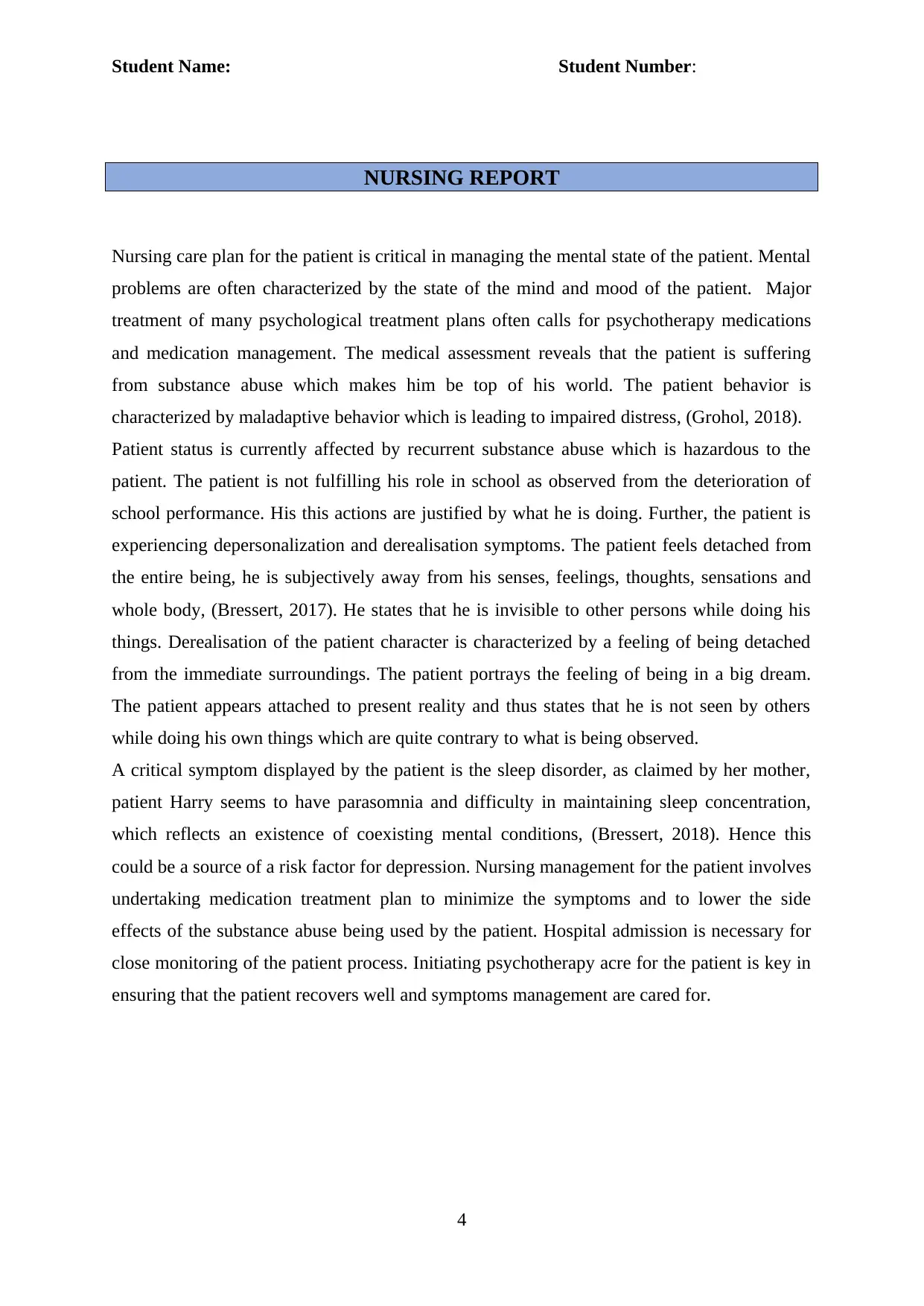
Student Name: Student Number:
NURSING REPORT
Nursing care plan for the patient is critical in managing the mental state of the patient. Mental
problems are often characterized by the state of the mind and mood of the patient. Major
treatment of many psychological treatment plans often calls for psychotherapy medications
and medication management. The medical assessment reveals that the patient is suffering
from substance abuse which makes him be top of his world. The patient behavior is
characterized by maladaptive behavior which is leading to impaired distress, (Grohol, 2018).
Patient status is currently affected by recurrent substance abuse which is hazardous to the
patient. The patient is not fulfilling his role in school as observed from the deterioration of
school performance. His this actions are justified by what he is doing. Further, the patient is
experiencing depersonalization and derealisation symptoms. The patient feels detached from
the entire being, he is subjectively away from his senses, feelings, thoughts, sensations and
whole body, (Bressert, 2017). He states that he is invisible to other persons while doing his
things. Derealisation of the patient character is characterized by a feeling of being detached
from the immediate surroundings. The patient portrays the feeling of being in a big dream.
The patient appears attached to present reality and thus states that he is not seen by others
while doing his own things which are quite contrary to what is being observed.
A critical symptom displayed by the patient is the sleep disorder, as claimed by her mother,
patient Harry seems to have parasomnia and difficulty in maintaining sleep concentration,
which reflects an existence of coexisting mental conditions, (Bressert, 2018). Hence this
could be a source of a risk factor for depression. Nursing management for the patient involves
undertaking medication treatment plan to minimize the symptoms and to lower the side
effects of the substance abuse being used by the patient. Hospital admission is necessary for
close monitoring of the patient process. Initiating psychotherapy acre for the patient is key in
ensuring that the patient recovers well and symptoms management are cared for.
4
NURSING REPORT
Nursing care plan for the patient is critical in managing the mental state of the patient. Mental
problems are often characterized by the state of the mind and mood of the patient. Major
treatment of many psychological treatment plans often calls for psychotherapy medications
and medication management. The medical assessment reveals that the patient is suffering
from substance abuse which makes him be top of his world. The patient behavior is
characterized by maladaptive behavior which is leading to impaired distress, (Grohol, 2018).
Patient status is currently affected by recurrent substance abuse which is hazardous to the
patient. The patient is not fulfilling his role in school as observed from the deterioration of
school performance. His this actions are justified by what he is doing. Further, the patient is
experiencing depersonalization and derealisation symptoms. The patient feels detached from
the entire being, he is subjectively away from his senses, feelings, thoughts, sensations and
whole body, (Bressert, 2017). He states that he is invisible to other persons while doing his
things. Derealisation of the patient character is characterized by a feeling of being detached
from the immediate surroundings. The patient portrays the feeling of being in a big dream.
The patient appears attached to present reality and thus states that he is not seen by others
while doing his own things which are quite contrary to what is being observed.
A critical symptom displayed by the patient is the sleep disorder, as claimed by her mother,
patient Harry seems to have parasomnia and difficulty in maintaining sleep concentration,
which reflects an existence of coexisting mental conditions, (Bressert, 2018). Hence this
could be a source of a risk factor for depression. Nursing management for the patient involves
undertaking medication treatment plan to minimize the symptoms and to lower the side
effects of the substance abuse being used by the patient. Hospital admission is necessary for
close monitoring of the patient process. Initiating psychotherapy acre for the patient is key in
ensuring that the patient recovers well and symptoms management are cared for.
4
Paraphrase This Document
Need a fresh take? Get an instant paraphrase of this document with our AI Paraphraser
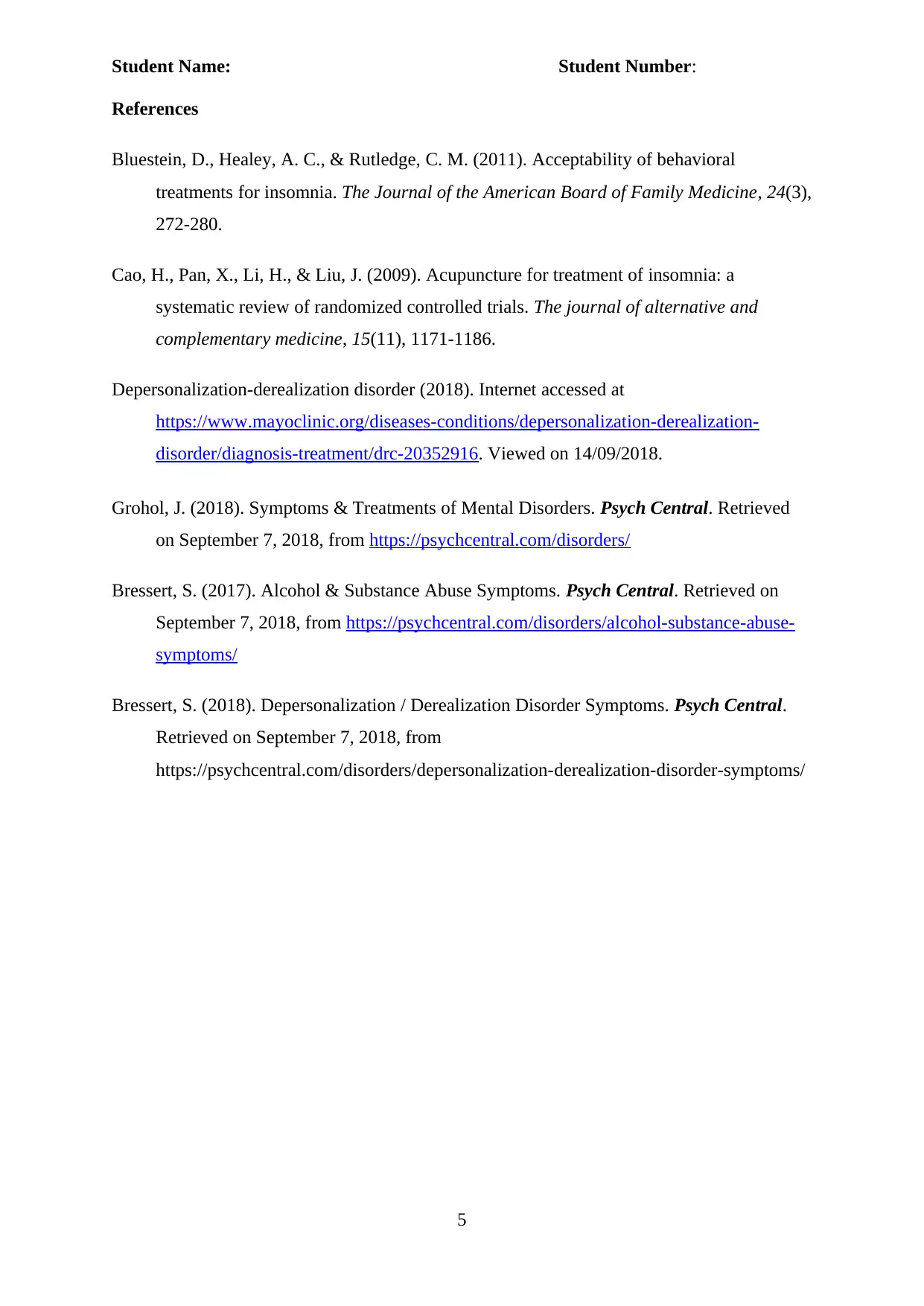
Student Name: Student Number:
References
Bluestein, D., Healey, A. C., & Rutledge, C. M. (2011). Acceptability of behavioral
treatments for insomnia. The Journal of the American Board of Family Medicine, 24(3),
272-280.
Cao, H., Pan, X., Li, H., & Liu, J. (2009). Acupuncture for treatment of insomnia: a
systematic review of randomized controlled trials. The journal of alternative and
complementary medicine, 15(11), 1171-1186.
Depersonalization-derealization disorder (2018). Internet accessed at
https://www.mayoclinic.org/diseases-conditions/depersonalization-derealization-
disorder/diagnosis-treatment/drc-20352916. Viewed on 14/09/2018.
Grohol, J. (2018). Symptoms & Treatments of Mental Disorders. Psych Central. Retrieved
on September 7, 2018, from https://psychcentral.com/disorders/
Bressert, S. (2017). Alcohol & Substance Abuse Symptoms. Psych Central. Retrieved on
September 7, 2018, from https://psychcentral.com/disorders/alcohol-substance-abuse-
symptoms/
Bressert, S. (2018). Depersonalization / Derealization Disorder Symptoms. Psych Central.
Retrieved on September 7, 2018, from
https://psychcentral.com/disorders/depersonalization-derealization-disorder-symptoms/
5
References
Bluestein, D., Healey, A. C., & Rutledge, C. M. (2011). Acceptability of behavioral
treatments for insomnia. The Journal of the American Board of Family Medicine, 24(3),
272-280.
Cao, H., Pan, X., Li, H., & Liu, J. (2009). Acupuncture for treatment of insomnia: a
systematic review of randomized controlled trials. The journal of alternative and
complementary medicine, 15(11), 1171-1186.
Depersonalization-derealization disorder (2018). Internet accessed at
https://www.mayoclinic.org/diseases-conditions/depersonalization-derealization-
disorder/diagnosis-treatment/drc-20352916. Viewed on 14/09/2018.
Grohol, J. (2018). Symptoms & Treatments of Mental Disorders. Psych Central. Retrieved
on September 7, 2018, from https://psychcentral.com/disorders/
Bressert, S. (2017). Alcohol & Substance Abuse Symptoms. Psych Central. Retrieved on
September 7, 2018, from https://psychcentral.com/disorders/alcohol-substance-abuse-
symptoms/
Bressert, S. (2018). Depersonalization / Derealization Disorder Symptoms. Psych Central.
Retrieved on September 7, 2018, from
https://psychcentral.com/disorders/depersonalization-derealization-disorder-symptoms/
5
1 out of 5
Related Documents
Your All-in-One AI-Powered Toolkit for Academic Success.
+13062052269
info@desklib.com
Available 24*7 on WhatsApp / Email
![[object Object]](/_next/static/media/star-bottom.7253800d.svg)
Unlock your academic potential
Copyright © 2020–2026 A2Z Services. All Rights Reserved. Developed and managed by ZUCOL.




